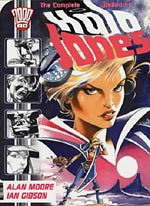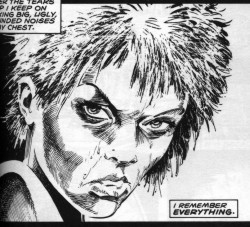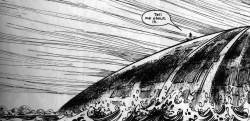>> The Friday Review: The Losers: Ante Up
>> The Friday Review: Marvels
More...

 Writer: Alan Moore
Writer: Alan Moore
Artist: Ian Gibson
Price: £12.99
Publisher: Titan Books
ISBN: 1840233427
I have a shocking admission to make - I'm not the biggest Radiohead fan that ever was. They tend to be a band whose body of work I respect, rather than enjoy. That said, one song of theirs has always stuck with me - and it's not because of a catchy tune or insightful lyric. It's due to a wonderful ideal espoused in a track title from their album PABLO HONEY: 'Anybody Can Play Guitar'.
The DIY ethos inherent in the song appealed to my sense of youthful rebellion - suffice to say, my 17-year-old self quickly got a hold of an acoustic guitar and set to. I'd never be Jimi Hendrix or The Edge, but then (as now), I could manage to strum a tune.
It took a little effort (and several lessons), but it paid dividends, thus proving the song right: anybody can do it.
In the course of relating of her life and times - courtesy of Alan Moore and Ian Gibson - Halo Jones expresses much the same opinion, regarding her adventures and travails. THE COMPLETE BALLAD OF HALO JONES is something of a misnomer (out of a projected nine books, only the three collected here saw the light of day), but as a fictional biography of sorts, it's extremely entertaining, despite taking some time to warm to.
Part of the reason why HALO JONES works as well as it does is due to the appealing nature of Halo herself - she endears herself to the reader through her sheer ordinariness. Indeed, Moore imagined her to be the sort of woman whom one would find waiting in the checkout queue at the local supermarket. Much like Roxanne O'Rourke in Moore's alien encounter tale, SKIZZ (reviewed here two weeks ago), Halo perseveres by dint of wishing her life were less ordinary, and taking steps to that effect by sheer pluck.
 Book One details Halo's life on the Hoop - an artificial environment situated off the coast of Manhattan, designed specifically to keep the unemployed masses of the future out of the way of the working class. On the Hoop, aliens and humans intermingle; soap operas are the drug of choice; cults and trends arise with alarming regularity; and going shopping requires weaponry and military precision.
Book One details Halo's life on the Hoop - an artificial environment situated off the coast of Manhattan, designed specifically to keep the unemployed masses of the future out of the way of the working class. On the Hoop, aliens and humans intermingle; soap operas are the drug of choice; cults and trends arise with alarming regularity; and going shopping requires weaponry and military precision.
Truth be told, the first few episodes of Book One immerse you so totally in the culture of the Hoop, it's easy to get lost. Stick with it, though, and you'll find yourself feeling the rhythm and pulse of the place Halo calls home. However, it is not a home Halo feels comfortable in - and when she experiences not one, but two personal tragedies in a number of hours, her mind is made up. Halo decides to leave the Hoop, with no intention of ever coming back. Thus, Halo's adventures begin.
Book One is essentially set-up and overture - the plot moves along at an appropriately manic tempo, and Gibson's art does its best to keep up. It moves from sketchy and anarchic (cf. his work on ROBO-HUNTER) to lush and detailed in the space of a few panels. Once the whirling-dervish pace lets up at Book One's denouement, the story (and the reader) can breathe a little easier, allowing for the languid crawl of Book Two.
There is a brief interlude, though, in which Halo's life and times are discussed by a university professor and his students in a future even farther from the one Halo exists in. (I get the feeling this was hinting at events that would play out in the later books, but I can only speculate.) Then Book Two begins proper, as we witness Halo adjusting to life as a hostess on board the starliner Clara Pandy. Over a span of months, Halo encounters the likes of terrorists, a cipher-like androgyne whom everyone seems to ignore, lovesick robot dogs, intelligent rats and dolphins, and, finally, the realisation that no matter how far you go, the past cannot be escaped.
To complement the more sedate goings-on in Book Two, Moore's script is somewhat less adventurous, while still managing the occasional flourish of invention and insight. Similarly, Gibson's art is merely adequate - it tells the story and little else, almost as if on autopilot. Things improve greatly in Book Three, though - and that is where HALO JONES comes into its own, despite the abrupt shift in focus and tone.
 Book Three succeeds due to its use of the genre 2000AD made its own - the future-war story - and its use of the staples of same to push beyond the usual conventions that readers would know. While reminiscent of other 2000AD strips in the same vein - ROGUE TROOPER and THE VCs, for example -
Book Three is less gung-ho and far more thoughtful. Yet, there are still visceral thrills to be had, if you're looking for that sort of thing.
Book Three succeeds due to its use of the genre 2000AD made its own - the future-war story - and its use of the staples of same to push beyond the usual conventions that readers would know. While reminiscent of other 2000AD strips in the same vein - ROGUE TROOPER and THE VCs, for example -
Book Three is less gung-ho and far more thoughtful. Yet, there are still visceral thrills to be had, if you're looking for that sort of thing.
Halo ends up joining Beta Platoon, more out of sheer boredom than anything else, having long left her hostess job behind. She immediately regrets it, as it's not just the Loyo Lobis terrorists she has to fight (unseen and evasive as they are); there are the more insidious horrors that the war makes visible. Soldiers who refuse to lay down their arms; the institutionalisation inherent in military training; time stretched and shrunk so that battles are fought quicker. No wonder that Halo becomes shell-shocked and inured to a war she didn't ask for. Worse, the past catches up to her once more - and this time, it's compounded by a final betrayal.
Moore and Gibson truly excel on Book Three, and seem more in tune - Moore's script is up to his usual lofty standard, and Gibson's art reaches a new level. Moore's fusion of Shakespeare and Moorcock gives depth and clarity to Halo's war, without ever seeming to preach or pass judgement. Meanwhile, Gibson's delineation of events approaches photo-realism at times, the storytelling appearing considered and unrushed. The synthesis of the two makes for a genuinely satisfying product, and is on a par with Moore's SWAMP THING work, or his output for the ABC line.
Recently, Radiohead front man Thom Yorke opined that for a while he detested guitars, but, "Now I kind of miss them." THE COMPLETE BALLAD OF HALO JONES makes me want to pick up a guitar again - if only to learn a few new songs. Which is ultimately the best anyone can hope to get from any artistic endeavour - that it may inspire others to do the same.
After all, anyone can do it, right?

This article is Ideological Freeware. The author grants permission for its reproduction and redistribution by private individuals on condition that the author and source of the article are clearly shown, no charge is made, and the whole article is reproduced intact, including this notice.


